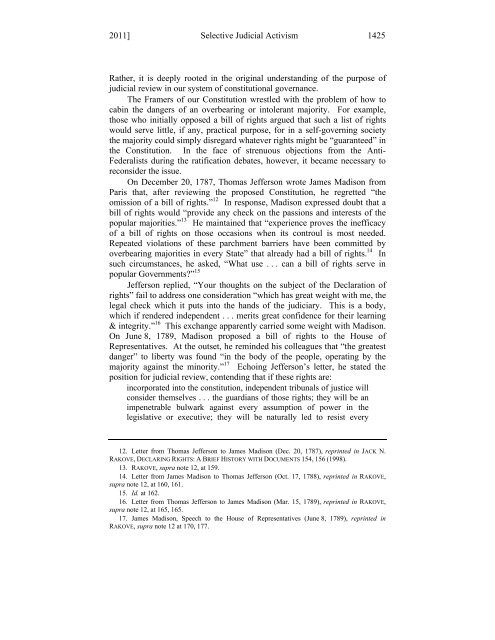Judicial ReEngineering
Judicial ReEngineering
Judicial ReEngineering
Create successful ePaper yourself
Turn your PDF publications into a flip-book with our unique Google optimized e-Paper software.
2011] Selective <strong>Judicial</strong> Activism 1425<br />
Rather, it is deeply rooted in the original understanding of the purpose of<br />
judicial review in our system of constitutional governance.<br />
The Framers of our Constitution wrestled with the problem of how to<br />
cabin the dangers of an overbearing or intolerant majority. For example,<br />
those who initially opposed a bill of rights argued that such a list of rights<br />
would serve little, if any, practical purpose, for in a self-governing society<br />
the majority could simply disregard whatever rights might be “guaranteed” in<br />
the Constitution. In the face of strenuous objections from the Anti-<br />
Federalists during the ratification debates, however, it became necessary to<br />
reconsider the issue.<br />
On December 20, 1787, Thomas Jefferson wrote James Madison from<br />
Paris that, after reviewing the proposed Constitution, he regretted “the<br />
omission of a bill of rights.” 12 In response, Madison expressed doubt that a<br />
bill of rights would “provide any check on the passions and interests of the<br />
popular majorities.” 13 He maintained that “experience proves the inefficacy<br />
of a bill of rights on those occasions when its controul is most needed.<br />
Repeated violations of these parchment barriers have been committed by<br />
overbearing majorities in every State” that already had a bill of rights. 14 In<br />
such circumstances, he asked, “What use . . . can a bill of rights serve in<br />
popular Governments?” 15<br />
Jefferson replied, “Your thoughts on the subject of the Declaration of<br />
rights” fail to address one consideration “which has great weight with me, the<br />
legal check which it puts into the hands of the judiciary. This is a body,<br />
which if rendered independent . . . merits great confidence for their learning<br />
& integrity.” 16 This exchange apparently carried some weight with Madison.<br />
On June 8, 1789, Madison proposed a bill of rights to the House of<br />
Representatives. At the outset, he reminded his colleagues that “the greatest<br />
danger” to liberty was found “in the body of the people, operating by the<br />
majority against the minority.” 17 Echoing Jefferson’s letter, he stated the<br />
position for judicial review, contending that if these rights are:<br />
incorporated into the constitution, independent tribunals of justice will<br />
consider themselves . . . the guardians of those rights; they will be an<br />
impenetrable bulwark against every assumption of power in the<br />
legislative or executive; they will be naturally led to resist every<br />
12. Letter from Thomas Jefferson to James Madison (Dec. 20, 1787), reprinted in JACK N.<br />
RAKOVE, DECLARING RIGHTS: A BRIEF HISTORY WITH DOCUMENTS 154, 156 (1998).<br />
13. RAKOVE, supra note 12, at 159.<br />
14. Letter from James Madison to Thomas Jefferson (Oct. 17, 1788), reprinted in RAKOVE,<br />
supra note 12, at 160, 161.<br />
15. Id. at 162.<br />
16. Letter from Thomas Jefferson to James Madison (Mar. 15, 1789), reprinted in RAKOVE,<br />
supra note 12, at 165, 165.<br />
17. James Madison, Speech to the House of Representatives (June 8, 1789), reprinted in<br />
RAKOVE, supra note 12 at 170, 177.

















